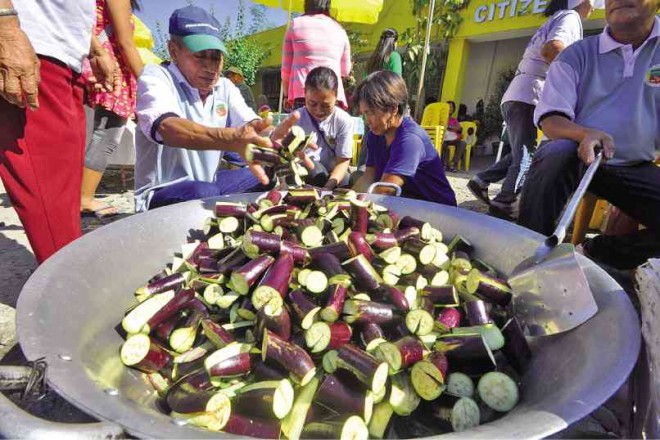Pangasinan town celebrates bounty from ‘talong’

Residents of Villasis town in Pangasinan province prepare “pinakbet,” a native vegetable dish, with locally grown “talong” (eggplants) among the major ingredients, during the Talong Festival. WILLIE LOMIBAO/CONTRIBUTOR
Farmer Ernesto Papio had all the reasons to join this town’s ‘Talong’ (Eggplant) Festival parade this year.
Harvest has been good, he said, and the price of eggplant, Villasis town’s leading agricultural product, has never been better.
At the parade here on Friday, which was also part of the fiesta celebration, Papio, 61, of of Barangay Piaz, joined other equally happy farmers who proudly marched around the town center.
Villasis has been paying tribute to its eggplant farmers through the festival over the last 10 years. “They are the reason our town remains the [Ilocos] region’s leading producer of eggplants,” Mayor Libradita Abrenica said.
Every year, the town produces about 16,000 metric tons (MT) of eggplants from 400 hectares of farms. This is about a fourth (24.3 percent) of the average 65,920 MT of eggplants that Pangasinan province produced from 2005 to 2013.
Article continues after this advertisementThe province’s production is about 85 percent of the region’s average total production of 77,811.13 MT during that period, data posted on the Bureau of Agricultural Statistics website (www.bas.gov.ph) showed.
Article continues after this advertisement“It has been a good year last year for our farmers. That’s why we have the Talong Festival not only to promote our eggplants, but as a way of thanksgiving for the bountiful harvest,” Abrenica said.
Villasis grows the long, violet hybrid eggplant variety year-round, said Cornelio Atchuela, the municipal agriculture officer. “During the rainy season, which is the off-season, we have only about 100 ha planted to eggplant,” Atchuela said.
The farms are located in the eastern villages of Piaz, Caramutan and Lipay.
Planting eggplants requires patience and hard work, Papio said. A typical day for him would mean being up before sunrise to inspect plants for red ants that may nibble on the plants.
“I have to see each one of the 8,000 plants [in a hectare] to make sure that they all will grow well,” he said.
Transplanting
Eggplant farming begins with sowing of the seeds in one part of the farms. Farmers wait for a month before the seedlings are transplanted.
“We have to hire several people to help us in the transplanting and finish the work before dusk,” Papio said. Transplanting starts at 3 p.m. so the plant would not wilt and survive.
A farmer typically spends about P80,000 for inputs and hiring of farm hands.
After about two months of caring for the plants is the first harvest. Papio said they pluck about 2,000 kilograms of eggplants from 8,000 plants.
If a kilogram of eggplant costs P40, a farmer makes about P80,000 for a single harvest, he said.
“Every five days for at least five months, we harvest eggplants from the same plants,” Papio said. “On a good planting season, we make about P100,000 a month,” he said.
Atchuela said the farmers could harvest even for the whole year if the plants were well taken care of.
Constantino Basilio, 48, who has been growing eggplants for more than 10 years, said eggplants were a big help to farmers’ families, especially in keeping their children in school.
Like Papio, Basilio said he would continue planting the vegetable because this was easier than tending rice.
“We were devastated during the floods caused by rains dumped by Typhoon “Pepeng” but we immediately bounced back,” Atchuela said. There was never a time when eggplant production went down, he added.